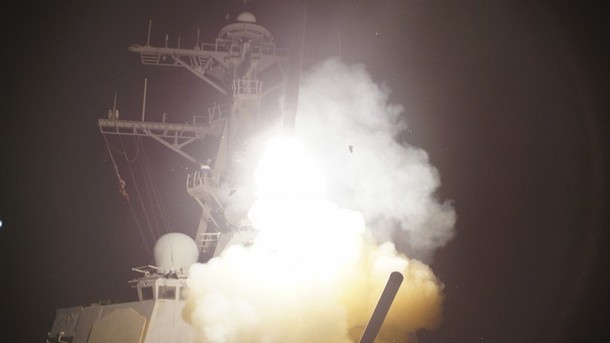
Stephen Walt recently posed the question in Foreign Policy, Is America Addicted to War? Prompted by the latest international intervention in Libya, Walt explains:
It remains to be seen whether this latest lurch into war [in Libya] will pay off or not, and whether the United States and its allies will have saved lives or squandered them. But the real question we should be asking is: Why does this keep happening? Why do such different presidents keep doing such similar things? How can an electorate that seemed sick of war in 2008 watch passively while one war escalates in 2009 and another one gets launched in 2011? How can two political parties that are locked in a nasty partisan fight over every nickel in the government budget sit blithely by and watch a president start running up a $100 million per day tab in this latest adventure? What is going on here?
- Because We Can (The United States has a military with global reach—few militaries can project power around the world through seapower and airpower)
- The U.S. has no Serious Enemies (The United States does not have a peer competitor that can constrain it or at least divert U.S. attention from humanitarian operations)
- The All-Volunteer Force (The lack of conscript military prevents public backlash against military interventions like Libya or Iraq. We in uniform understand how the military is a tool of foreign policy.)
- The Establishment (a combination of neo-conservatives and liberal interventionists advocate active opposition to authoritarian regimes or humanitarian interventions.)
- Congress has Checked out (There is no serious legislative check to the presidential ability to use military force).
Walt’s five reasons are helpful, but he overlooks a key reason missing—allies expect it. With Libya in mind, the U.S. did not rush to war—it waited for a UN Security Resolution, Arab League support, and European leadership. Once the air campaign started, the U.S. was a reluctant leader. Paris or London was more important than Washington. The U.S. has been plain on what can and cannot be achieved through military intervention.
From the start of the air campaign, the US government has been extremely reticent about its goals in Libya. President Obama said on March 18, “The United States is not going to deploy ground troops into Libya. And we are not going to use force to go beyond a well-defined goal — specifically, the protection of civilians in Libya.” With this in mind and a review of reasons for intervention in Haiti, Bosnia, Kosovo and persistent presence in Iraq and Afghanistan, “war” is the wrong word to understand how the military fits in U.S. foreign policy and military strategy today.
To be sure, U.S. military interventions are violent, but they are quickly followed by a more intense effort to provide humanitarian relief, promote security, and develop indigenous militaries. Critics of U.S. military intervention fail to take into account that the United States does not invade countries to take territory or install puppet regimes. Rather, the United States with its allies set in place, no matter how flawed, democratic processes to allow self-determination. And it aids new (e.g. Kosovo), struggling (e.g. Mexico), or transforming states (e.g. Georgia) with security and development assistance programs. Relatively unlimited, the United States provides security assistance to about 150 countries. As I wrote in Exporting Security, these efforts are driven both by a liberal ideal of making the world better, but also an instrumental understanding that allies expect it. By doing so, the United States seeks to improve its international image, strengthen the state sovereignty system by training and equipping partners’ security forces, prevent localized violence from escalating into regional crises, and protect U.S. national security by addressing underlying conditions.
Derek S. Reveron, an Atlantic Council contributing editor, is assigned to NTM-A; his latest book is Exporting Security: International Engagement, Security Cooperation, and the Changing Face of the U.S. Military. He is currently on leave from the Naval War College.
Image: tomahawk.jpg

